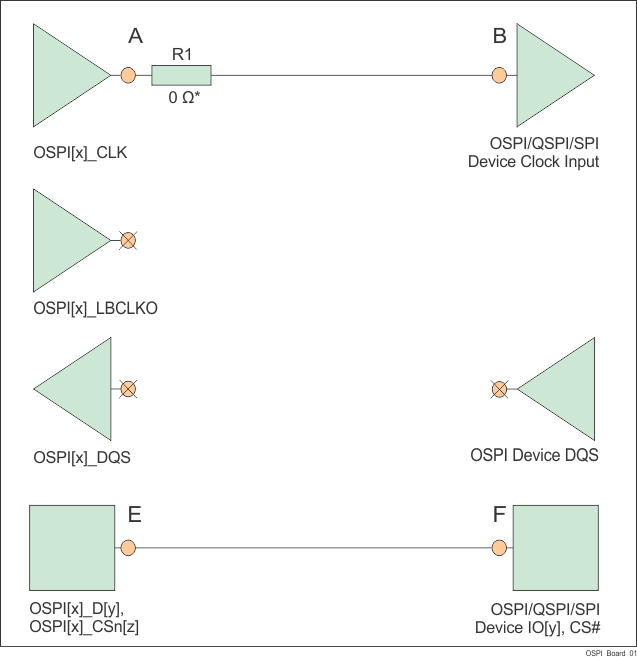SPRSP65G April 2021 – May 2024 AM2431 , AM2432 , AM2434
PRODUCTION DATA
- 1
- 1 Features
- 2 Applications
- 3 Description
- 4 Device Comparison
-
5 Terminal Configuration and Functions
- 5.1 Pin Diagram
- 5.2 Pin Attributes
- 5.3
Signal Descriptions
- 17
- 5.3.1 AM243x_ALX Package - Unsupported Interfaces and Signals
- 5.3.2 ADC
- 5.3.3 CPSW
- 5.3.4 CPTS
- 5.3.5 DDRSS
- 5.3.6 ECAP
- 5.3.7 Emulation and Debug
- 5.3.8 EPWM
- 5.3.9 EQEP
- 5.3.10 FSI
- 5.3.11 GPIO
- 5.3.12 GPMC
- 5.3.13 I2C
- 5.3.14 MCAN
- 5.3.15 SPI (MCSPI)
- 5.3.16 MMC
- 5.3.17 OSPI
- 5.3.18 Power Supply
- 5.3.19 PRU_ICSSG
- 5.3.20 Reserved
- 5.3.21 SERDES
- 5.3.22 System and Miscellaneous
- 5.3.23 TIMER
- 5.3.24 UART
- 5.3.25 USB
- 5.4 Pin Connectivity Requirements
-
6 Specifications
- 6.1 Absolute Maximum Ratings
- 6.2 ESD Ratings
- 6.3 Power-On Hours (POH)
- 6.4 Recommended Operating Conditions
- 6.5 Operating Performance Points
- 6.6 Power Consumption Summary
- 6.7
Electrical Characteristics
- 6.7.1 I2C Open-Drain, and Fail-Safe (I2C OD FS) Electrical Characteristics
- 6.7.2 Fail-Safe Reset (FS RESET) Electrical Characteristics
- 6.7.3 High-Frequency Oscillator (HFOSC) Electrical Characteristics
- 6.7.4 eMMCPHY Electrical Characteristics
- 6.7.5 SDIO Electrical Characteristics
- 6.7.6 LVCMOS Electrical Characteristics
- 6.7.7 ADC12B Electrical Characteristics (ALV package)
- 6.7.8 ADC10B Electrical Characteristics (ALX package)
- 6.7.9 USB2PHY Electrical Characteristics
- 6.7.10 SerDes PHY Electrical Characteristics
- 6.7.11 DDR Electrical Characteristics
- 6.8 VPP Specifications for One-Time Programmable (OTP) eFuses
- 6.9 Thermal Resistance Characteristics
- 6.10
Timing and Switching Characteristics
- 6.10.1 Timing Parameters and Information
- 6.10.2 Power Supply Requirements
- 6.10.3 System Timing
- 6.10.4 Clock Specifications
- 6.10.5
Peripherals
- 6.10.5.1 CPSW3G
- 6.10.5.2 DDRSS
- 6.10.5.3 ECAP
- 6.10.5.4 EPWM
- 6.10.5.5 EQEP
- 6.10.5.6 FSI
- 6.10.5.7 GPIO
- 6.10.5.8 GPMC
- 6.10.5.9 I2C
- 6.10.5.10 MCAN
- 6.10.5.11 MCSPI
- 6.10.5.12 MMCSD
- 6.10.5.13 CPTS
- 6.10.5.14 OSPI
- 6.10.5.15 PCIe
- 6.10.5.16
PRU_ICSSG
- 6.10.5.16.1 PRU_ICSSG Programmable Real-Time Unit (PRU)
- 6.10.5.16.2 PRU_ICSSG Pulse Width Modulation (PWM)
- 6.10.5.16.3 PRU_ICSSG Industrial Ethernet Peripheral (IEP)
- 6.10.5.16.4 PRU_ICSSG Universal Asynchronous Receiver Transmitter (UART)
- 6.10.5.16.5 PRU_ICSSG Enhanced Capture Peripheral (ECAP)
- 6.10.5.16.6 PRU_ICSSG RGMII, MII_RT, and Switch
- 6.10.5.17 Timers
- 6.10.5.18 UART
- 6.10.5.19 USB
- 6.10.6 Emulation and Debug
-
7 Detailed Description
- 7.1 Overview
- 7.2 Processor Subsystems
- 7.3 Accelerators and Coprocessors
- 7.4
Other Subsystems
- 7.4.1 PDMA Controller
- 7.4.2
Peripherals
- 7.4.2.1 ADC
- 7.4.2.2 DCC
- 7.4.2.3 Dual Date Rate (DDR) External Memory Interface (DDRSS)
- 7.4.2.4 ECAP
- 7.4.2.5 EPWM
- 7.4.2.6 ELM
- 7.4.2.7 ESM
- 7.4.2.8 GPIO
- 7.4.2.9 EQEP
- 7.4.2.10 General-Purpose Memory Controller (GPMC)
- 7.4.2.11 I2C
- 7.4.2.12 MCAN
- 7.4.2.13 MCRC Controller
- 7.4.2.14 MCSPI
- 7.4.2.15 MMCSD
- 7.4.2.16 OSPI
- 7.4.2.17 Peripheral Component Interconnect Express (PCIe)
- 7.4.2.18 Serializer/Deserializer (SerDes) PHY
- 7.4.2.19 Real Time Interrupt (RTI/WWDT)
- 7.4.2.20 Dual Mode Timer (DMTIMER)
- 7.4.2.21 UART
- 7.4.2.22 Universal Serial Bus Subsystem (USBSS)
-
8 Applications,
Implementation, and Layout
- 8.1 Device Connection and Layout Fundamentals
- 8.2
Peripheral- and Interface-Specific Design Information
- 8.2.1 General Routing Guidelines
- 8.2.2 DDR Board Design and Layout Guidelines
- 8.2.3 OSPI/QSPI/SPI Board Design and Layout Guidelines
- 8.2.4 USB VBUS Design Guidelines
- 8.2.5 System Power Supply Monitor Design Guidelines
- 8.2.6 High Speed Differential Signal Routing Guidance
- 8.2.7 Thermal Solution Guidance
- 8.3 Clock Routing Guidelines
- 9 Device and Documentation Support
- 10Revision History
- 11Mechanical, Packaging, and Orderable Information
Package Options
Refer to the PDF data sheet for device specific package drawings
Mechanical Data (Package|Pins)
- ALV|441
- ALX|293
Thermal pad, mechanical data (Package|Pins)
Orderable Information
8.2.3.1 No Loopback, Internal PHY Loopback, and Internal Pad Loopback
- The OSPI[x]_CLK output pin must be connected to the CLK input pin of the attached OSPI/QSPI/SPI device
- The signal propagation delay from the OSPI[x]_CLK pin to the attached OSPI/QSPI/SPI device CLK pin (A to B) must be ≤ 450 ps (~7cm as stripline or ~8cm as microstrip)
- The signal propagation delay of each OSPI[x]_D[y] and OSPI[x]_CSn[z] pin to the corresponding attached OSPI/QSPI/SPI device data and control pin (E to F, or F to E) must be approximately equal to the signal propagation delay from the OSPI[x]_CLK pin to the attached OSPI/QSPI/SPI device CLK pin (A to B)
- 50 Ω PCB routing is recommended along with series terminations, as shown in Figure 8-2
- Propagation delays and matching:
- (A to B) ≤ 450 ps
- (E to F, or F to E) = ((A to B) ± 60 ps)

* 0 Ω resistor
(R1), located as close as possible to the OSPI[x]_CLK pin, is placeholder for
fine tuning, if needed.
Figure 8-2 OSPI
Connectivity Schematic for No Loopback, Internal PHY Loopback, and Internal Pad
Loopback